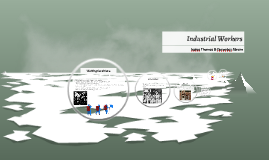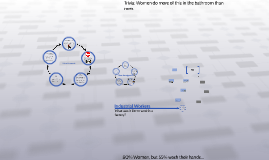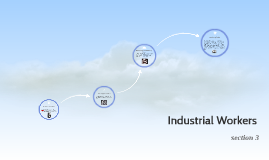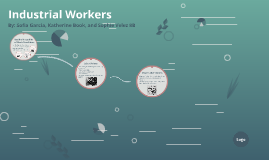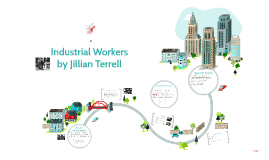Industrial Workers
Transcript: Child Labor Law Children had to be at least 12 years old to work in factories and could not be worked for more than 10 hours a day. The law did not work, most kids worked for farms and the law did not apply to farms. Most factory owners did not follow the law. Trivia: Women do more of this in the bathroom than men. 80% Women, but 55% wash their hands.... Most Americans were afraid of unions and thought of them of terrorist groups. Economic growth and progress helped make America rich, but cost the American worker health, life, and ability to have a good life. New Immigration What was it like to work in a factory? Horrible working conditions New immigration took place between 1880-1920. Came from Eastern European countries. Russia, Greece, Hungary, Italy, Turkey, Poland, Japan, China, Mexico. Did not blend into American culture easily. Adjusting to America The Journey to America. Were pushed out of their homes by trouble in their home countries, and pulled to America by new opportunities. Pushes = high unemployment, economic depression, war, religious persecution, crop failures/starvation. Pull=Jobs, money, land, freedom. Where to Live Immigrants crossing the Atlantic came to Ellis Island in New York City. Immigrants crossing the Pacific came to Angel Island in San Francisco Bay. Cities become the region where immigrants and americans mix cultures. They become the melting pot of America where cultures mix together. People had to Assimilate, or become part of America. Many immigrants wanted to hold on to their own culture and become American, but this was very hard to do. Language: Parents spoke native language, kids spoke both English and native language, grandkids spoke only English. Americans do not like the new languages, religions, and customs, and a movement to keep immigrants out began. Chinese exclusion act 1882- No Chinese immigrants are allowed in for 10 years. It was renewed in 1892, and 1902. Immigration Act 1882 - No criminals and all immigrants must pay a tax. Immigrations Act 1897 - Immigrants must be able to read and write. Conditions Workers Act STRIKE! FIN Arrival Some immigrants had family they could move in with, but most showed up with everything they owned and nowhere to live. Unions would help workers to strike, or refuse to work, if their demands for safe work and equal pay were not met. These strikes sometimes became violent and resulted in death and destruction. Eventually Unions did help workers get the conditions they wanted and needed. American Reaction Entering America Few immigrants spoke English, and almost none had jobs. How would these people survive? Pay Why did they come? New Immigrants What to do? Many immigrants came from farms and had no education. They were forced to settle in industrial cities and work in factories. This created neighborhoods inside of cities that were similar to immigrant homelands. Americans working for the government would examine you. Names would be recorded, and sometimes shortened to be made easier to spell or write. Occupation, and home country would be recorded. Health exam to decide if you would be allowed in. Cities Become Melting Pots Some Americans were upset that immigrants were taking American jobs. Before 1865 American were afraid of the changes they saw. The mixing of cultures scared some Americans. New Laws Dangerous Crowded Fast Paced work uncovered machine parts No safety equipment little training long hours low pay could be fired for any reason at any time Terrible pay and dangerous working conditions force workers to act. They organize into groups and demand better pay and safer working conditions. These groups are known as labor unions. Labor unions wanted collective bargaining; meetings between unions who represent the laborers and the management. Industrial Workers Living in America. American get mad. Supplied the country with needed labor for factories. Helped shape American culture. Helped grow cities into the multicultural places they are today. Becoming American Nativist Movement Finding Work Why? Very low wages for very hard work. Factory owners wanted to mass produce as many finished goods as possible and ran their factories as hard and fast as possible. Women were paid less than men. Children were paid less than men and women. Hardest part of immigration was finding work. Most immigrants became laborers in factories, sweatshops, and mills. They worked the hardest jobs, the longest hours, and were given the lowest pay. Walk to the nearest port/harbor, sometimes hundreds of miles away. Get on a boat that had the cheapest tickets, and stay in the cheapest part of the boat for weeks as you cross the Atlantic or pacific. Arrive in America as a tired, poor, and hungry immigrant ready for a new start. Most immigrants came from western european countries. (England, France, Spain) They blended into American culture easily. Where to go? Immigrant Impact








